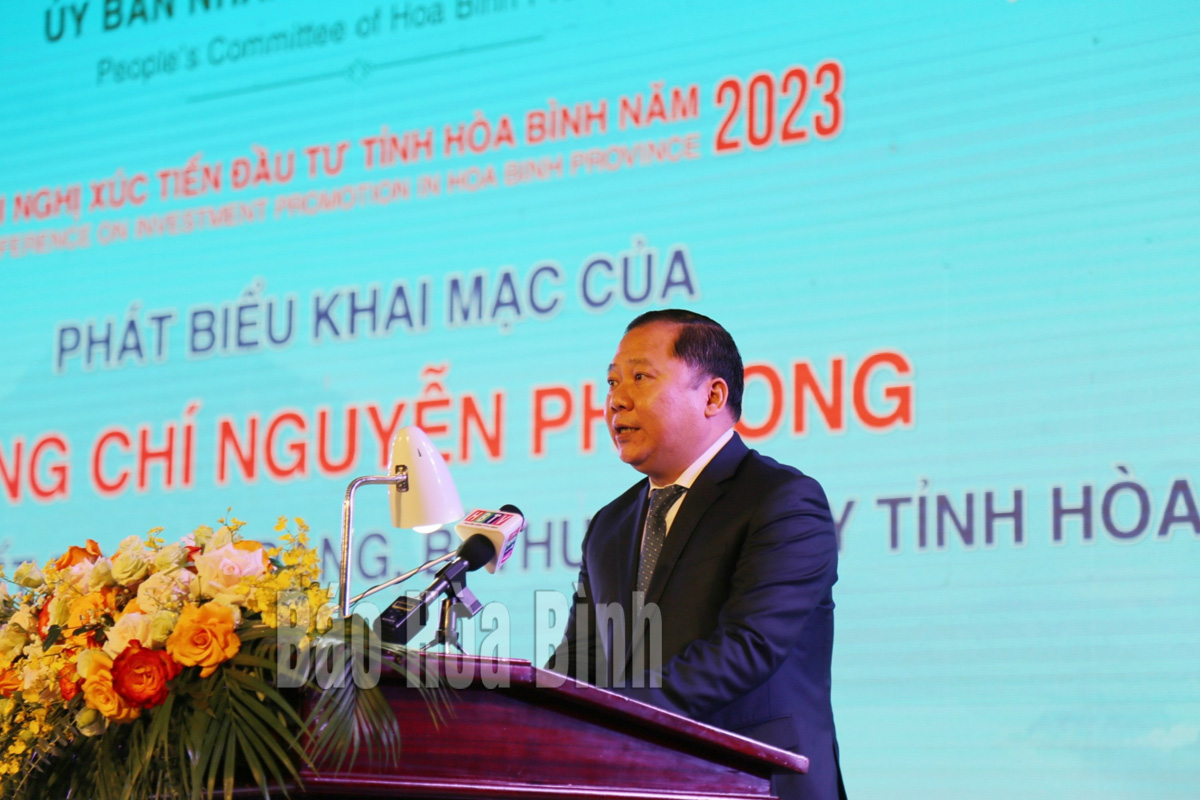(HBO) - Secretary of the Hoa Binh provincial Party Committee Nguyen Phi Long delivered an opening remarks at the Hoa Binh Investment Promotion Conference 2023 on February 26.
Nguyen Phi Long, alternate member of the Party Central Committee and Secretary of the Hoa Binh Party Committee Nguyen Phi Long delivers the opening remarks at the Hoa Binh Investment Promotion Conference 2023.
Long highlighted the conference’s significance as an important political event of the province, giving a chance for the locality to introduce its potential and investment opportunities to investors and businesses inside and outside the country.
He thanked ministries, sectors, central agencies and localities as well as businesses and investors for their support to the development of Hoa Binh over the past 30 years.
The provincial Party leader underlined that Hoa Binh is a land with rich culture, a cradle of the ancient Vietnamese people, and an important political, economic and military position, locating in the western gate of the capital city of Hanoi.
Hoa Binh is strong in agriculture with many famous products such as Cao Phong orange, Tan Lac red-flesh pomelo, and Da River fish, many of which are exported to the EU and Japanese markets, he said.
Meanwhile, the province is home to eight industrial parks with total area of more than 1,500 hectares, he said, adding that it is working on a project to expand Lac Thinh IP to about 1,000 hectares, and developing three more with total area of over 1,260 hectares, and 21 industrial clusters covering over 800 hectares. In 2025, total area of IPs and industrial clusters is expected to account for about 1% of the locality's natural land, said Long.
At the same time, Hoa Binh has paid great attention to developing culture in parallel with economic development, promoting the Muong culture and Hoa Binh Civilisation. Currently, the province has 786 intangible cultural heritages, more than 18,000 items related to the Hoa Binh Civilisation. Hoa Binh has made great efforts to restore and develop traditional values, contributing to improving the material and spiritual life of locals, he said.
Long underscored that Hoa Binh has high potential for the development of eco-tourism, resort tourism, cultural tourism and spiritual tourism. With an aim to turn tourism into a spearhead sector, and become a major tourism centre of the northern midland and mountainous region, Hoa Binh has focused on developing many tourist destinations and areas, especially the Hoa Binh Lake tourist area, one of the 12 national tourist areas in the region.
The provincial leader said that the province has offered special incentives to investors in localities with extremely difficult situation, including the exemption of corporate income tax in the first four years and reduction of the tax by 50% in the following nine years, along with exemption in land use and import taxes.
The province is calling for investment in high-tech agriculture, manufacturing and processing of agricultural products and food; the development of supply chains and goods selling; and the construction of national tourism areas and destinations as well as the connection of tours, he said.
He pledged that the province will work hard to speed up the process of investment procedures, saving times for investors.
Hoa Binh is keeping its door open for domestic and foreign investors, especially in high-tech agriculture, manufacturing-processing, trade, service and tourism, he stressed, vowing to create optimal conditions for them to successfully implementing their projects and developing sustainably, with a motto of "the local administration always accompanies investors during their development.”/.



